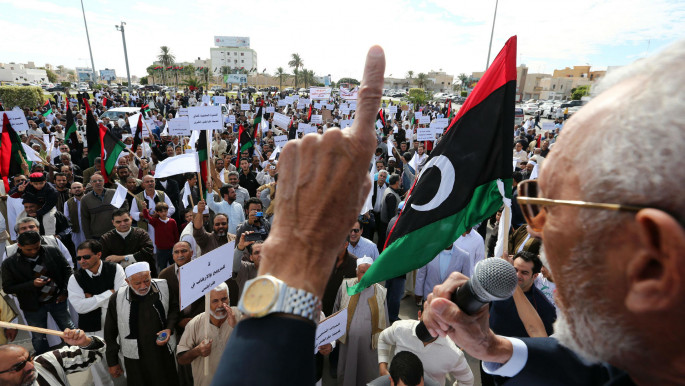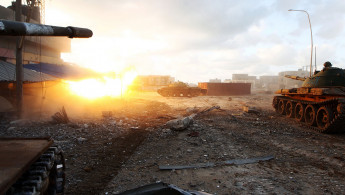Upheaval in Tripoli and Misrata rocks Libya's 'unity government'
Libya's complex civil war is boiling to the surface in the capital.
Following violent militia clashes, citizens have taken their frustrations to the streets. Friday March 17 began with protesters in central Tripoli calling for the deployment of the army and police. Gradually the crowd grew and marched on to Martyrs' Square.
"It was massive - between eight and ten thousand people," says Ayub, a former pilot. "People came to show they are fed up with militia rule."
But the protest did not proceed as planned. "A lot of the youth joined in, to convey their own message," he adds. By the evening some had started chanting insults towards certain figureheads, and called for the takeover of the capital by the East Libyan army.
"The people want Field Marshal Haftar," one group of young men shout in video clips shared online. Suddenly, gunshots dispersed the crowd. According to law professor Khaled, who witnessed the scene, gunmen arrived in three Toyota Land Cruisers and shot into the air:
"People on the square panicked, thinking there were snipers on the rooftops."
The Presidency Council, which heads the UN-backed Government of National Accord, responded swiftly, condemning the shooting and opening an inquiry. While reminding citizens of the right to freedom of speech, it also warned Libyans not to "let themselves be dragged into the divisions".
Tripoli is rife with tension, and the pro-Haftar slogans were widely seen as provocative. Even the organisers of the protest were embarrassed.
"The purpose was to call for the withdrawal of armed groups from the capital, but unfortunately it got out of control. Our protest culture is not very developed," said Ahmed al-Ghedan, a member of the protest organising committee.
| Report continues after map |
 |
Militia wars
In the days leading up to the protest, Tripoli saw heavy fighting across the city, in the latest outbreak of inter-militia violence.
Although flashpoints of anger include competition for the control of strategic locations and assets - such as banks - the recent racheting up of violence has a political backdrop.
In the capital, the internationally recognised government, the GNA, is being challenged by its resurrected predecessor - the self-declared Salvation Government - which has, over the past few months, seized several government buildings by force.
| Read more: Exclusive - Libyan State Council President Abdulrahman Sewehli speaks to The New Arab |
Meanwhile, some 600km east of Tripoli in the Oil Crescent, the GNA is fighting the East Libyan army led by Khalifa Haftar, in clashes which escalated at the start of March.
Last but not least, there is a regionalist dimension to the Tripoli clashes - as many in the capital loathe the continued presence of armed groups from Misrata, West Libya's biggest military power. This sentiment stems particularly from "the Gharghur massacre" of November 2013, when Misratan fighters opened fired on Tripoli protesters, inflicting heavy losses.
The latest clashes pit a loose coalition of Tripoli-based brigades affiliated with the GNA against mostly Misratan groups, some of which are affiliated with the Salvation Government.
What further complicates the matter is that the Misratan groups are also part of a powerful military coalition named Al-Bunyan al-Marsus, which recently defeated the local Islamic State group franchise in the central Libyan city of Sirte - under the banner of the GNA.
| Libya's breakdown of authority | |
|
Libya’s post-revolutionary transition stalled in 2014, when the outgoing General National Congress (GNC) refused to step down. Controversial matters such as the role of Islam in politics and the inclusion of former regime officials polarised the political scene. Operation Dignity - launched by army general Khalifa Haftar in May 2014 against extremists terrorising the eastern city of Benghazi - deepened the divide. Though gaining popularity in the east, Haftar alienated factions in West Libya by vilifying political Islam. In the wake of the June 2014 parliamentary elections, fighting erupted in Tripoli, resulting in the destruction of Tripoli International Airport. Unable to take its seat in Tripoli, the new legislature - the House of Representatives (HoR) - settled in the east, while the capital fell under the rule of armed coalition Libya Dawn. The HoR formed the Interim Government to counter the GNC-backed Salvation Government in Tripoli. A UN-led dialogue process involving members of the HoR and GNC, as well as independents, culminated in the signing of the Libyan Political Agreement (LPA) in December 2015. A key goal of this was to form a Government of National Accord (GNA), representing major regional and political constituencies. The GNA’s leadership - the Presidency Council - entered the capital in March 2016, but subsequently failed to gain HoR approval for its cabinet proposals. The LPA remained largely unimplemented, as signatories failed to bring more hardline actors into the fold, leaving the Presidency Council struggling for authority. Meanwhile, battlefronts hardened, with Haftar consolidating power in the east, while groups in West Libya - in particular in Misrata - propping up his adversaries. Foreign support for Libyan armed factions reduced incentives for dialogue. Hopes that the offensive led by Misrata groups against IS in Sirte last year would galvanise support across political divides failed to materialise. |
The GNA relies heavily on the big guns of Misrata and thus tried to ease tensions, brokering a ceasefire deal with municipal representatives of the two cities and Bunyan Marsus commanders.
It entailed deploying one of Misrata's largest brigades to take over the Salvation Government's headquarters - a building that a GNA-affiliated brigade had just seized.
But the deal was rejected by key Tripoli brigades, and "infuriated Tripolitans even more", said protester Ayub.
"Even the mayor of Tripoli agreed to this, which shows he doesn't defend our interests and is merely a puppet," he told The New Arab.
The chaos comes at the expense of the GNA, which has been widely criticised for its reliance on semi-official armed groups for security, and to the benefit of Haftar's camp, which has long portrayed the UN-backed government as a failure.
East Libyan army chief Haftar did not miss the opportunity. In a rare TV interview, he reiterated that his forces would soon "liberate" the capital from the "murderous gangs and terrorists shooting at peaceful protesters".
But an attack by Haftar's forces would likely encounter fierce resistance. In an immediate response to Haftar, 22 Tripoli-based brigades issued a joint statement rejecting any "return to military dictatorship", condemning the "glorification of Haftar".
Khalifa Ghwell, the Salvation Government's "prime minister", has come out to blame the GNA for the clashes and to confirm he secretly met with rival authorities in the east.
Things fall apart in Misrata
Meanwhile, the developments in Tripoli opened up rifts between armed groups in Misrata, and emboldened those hostile to the GNA.
| Comment: Libya's conflict revolves around power and oil |
The tangible anti-Misrata sentiment at the protest that Friday - which featured deplorable chants labelling Misratans "Jews" and calling on Haftar to "exterminate them" - caused outrage in Libya's third city.
Misratan parliamentarians and the city's municipal council slammed the GNA's Presidency Council for not condemning the protesters' "incitement of hatred and violence against Misrata", and declared a suspension of all contact with the Presidency Council until it presented a formal apology.
More importantly, territorial gains by GNA-affiliated brigades in Tripoli pushed supporters of the Salvation Government to make bold moves.
 |
|
| Protests in Tripoli sparked outrage in Misrata [AFP] |
On Saturday March 18, a group referring to itself as "the Misrata revolutionaries" closed the road to Tripoli and stormed Misrata's municipal office building. The town's municipal council decried the aggressors as merely seeking revenge for the Tripoli ceasefire deal.
But by the following Tuesday, the city's military council sided with the hardliners and declared the municipal council sacked.
The implications of this move have yet to fully unfold, but it bodes ill for the UN-backed, internationally recognised GNA in Tripoli.
The calm before the storm
Flashback to February. Sitting in his pleasant office in downtown Tripoli, Transport Minister Milad Matouq was trying hard to show Libya in a positive light.
"This country has great potential and everybody can benefit from it," he said. In office since June 2016, the minister assured that he and his colleagues had been doing their best to provide services to the population.
In his first week in office, Maatuq negotiated the reopening of flights to Tunis from Tripoli's Mitiga airbase, to which all flights were diverted in 2014 after militia fighting left Tripoli International Airport in ruins.
"We are now working to improve procedures at Mitiga to obtain the lifting of the EU flight ban on Libyan aircraft," the minister said, adding that his government was also about to sign an agreement with an Italian company to build a new terminal at the International Airport.
Tellingly, the rival Salvation Government was already fixing the airport, in an attempt to outflank and embarrass the GNA. In the wake of this year's "revolution day" - February 17 (commemorating 2011's "Day of Rage") - Khalifa Ghwell hosted a pompous ceremony to inaugurate the refurbished VIP lounge.
While Ghwell lost his headquarters last week, his forces still hold the airport.
Political stalemate
Where they can operate, GNA ministers may be efficient technocrats, but their leadership faces some fundamental issues.
As much as it was designed to represent different regional and political constituencies, the nine-member Presidency Council also embodies Libya's divisions: The South Libyan representative quit his job. Two others defend Haftar's position and are boycotting sessions Council sessions. The rest rarely agree on anything.
More importantly, the Presidency Council never received the green light from Libya's official parliament - the House of Representatives, whose own internal divisions have prevented it from endorsing the GNA as laid out in the UN-brokered Libyan Political Agreement of December 2015.
The cabinet of which minister Matouq is part thus operates in a legal void.
Stakeholders in Misrata who are party to the LPA voiced their concerns during conversations in early February.
"The non-implementation of the political agreement has paralysed the Presidency Council," said Mayor Mohamed Ishtiwi. "When I speak to the ministers they say they are only appointees, so they cannot exercise their duties effectively."
Ishtiwi blames both the international community and the parliament. "We told the UN from the start not to recognise the HoR until it endorses the Political Agreement. But unfortunately they dealt with the HoR as a legal body."
Belgassem Gzit, a Misratan politician and LPA signatory, says a legally endorsed GNA would have no trouble fending off Ghwell and tackling Tripoli's security problems.
"The forces in Tripoli are little more than gangs - they can be bought off and contained," he said. "If I were in the Presidency Council's place, I'd form a task-force based on regional representation and train them in Tunisia. With as few as 500 well-paid professional soldiers they'd be able to control the capital."
But the prospect of parliamentary approval and security sector reform seem further removed than ever.
In reaction to events in the Oil Crescent, the HoR declared the Presidency Council illegal.
The vote has been rejected as non-quorate by MPs who back the GNA, but held up by the HoR presidency. Meanwhile, the clashes in Tripoli show, once again, that local armed groups are unlikely to cede power. And finally, the latest developments in Misrata could yet cut open the ground under the GNA's feet.
Valerie Stocker is a freelance journalist and research consultant focused on Libya.



